Editor of this issue: Jonas Zdanys
Copyright © 1986 LITUANUS Foundation, Inc.

|
LITUANUS
LITHUANIAN QUARTERLY JOURNAL OF ARTS AND SCIENCES
Volume 32, No. 1 - Spring 1986
Editor of this issue: Jonas Zdanys ISSN 0024-5089
Copyright © 1986 LITUANUS Foundation, Inc. |

|
IVAR IVASK
Poems and Drawings
Ivar Ivask, Estonian poet, artist and critic, is Professor of Modern Languages and Literatures at the University of Oklahoma, where he has edited (since 1967) the international literary quarterly World Literature Today (formerly Books Abroad) and directed its two affiliated biennial literary programs, the Neustadt International Prize for Literature (1970- ) and the Puterbaugh Conferences on Writers of the French-Speaking and Hispanic World (1968- ). He is married to the Latvian poet Astrid Ivask, co-translator of the poems that follow.
Mr. Ivask is the author of seven books of poetry in Estonian — Tahtede tahendus (The Meaning of Stars, 1964), Pa'ev astub kukesammul (The Day Arrives With a Rooster's Step, 1966), Ajaloo aiad (The Gardens of History, 1970), Oktoober Oklahomas (October in Oklahoma, 1973), Verikivi (Bloodstone, illustrated by the Author, 1976), Elukogu (Life Collection, collected poems 1958-1978, illustrated by the Author, 1978), and Verandaraamat (The Veranda Book, 1981) — and of one book in German, Gespiegelte Erde (Mirrored Earth, selected poems 1953-1963), published in 1967. His work has also appeared in English — in the collection Oklahoma October, Selected Poems 1958-1984, translated by the Author and Astrid Ivask, cover design and illustrations by the Author — and in Italian in the book // Libro della Veranda, the first section of "The Veranda Book," translated by Roberto Sanesi. His drawings and collages have been exhibited in two one-man shows at the University of Oklahoma's Museum of Art (1979 and 1984) and the Oklahoma Art Center, Oklahoma City (1986), which included also photographs.
The poems that follow comprise the second section, "In the Circle of the Veranda," of "The Veranda Book." They have been translated from the Estonian by the Author and by his wife, Astrid Ivask. Photographs of six of Mr. Ivask's drawings follow the poems. The drawings, as he commented, "try not to represent or portray but rather to evoke. Their initial impulse was always an inner rhythm which organically insisted on further development and expansion into larger spatial patterns. Gradual crystallization of the cosmically inchoate, nebulous. Worlds emerging or vanishing. The process of crystallization may at times approach already existent forms such as a landscape, a tree, a flower, a rock, the human figure. Yet this is not the conscious aim of these drawings, Just as good poems, so do these drawings aim at a multivalent expression of experience which includes the creative participation of viewer and reader in the exploration of illuminating ultimate meaning."
13
The veranda emerges from the flow of days,
hardly an equivalent of dreams, rather
a blinking lighthouse which sank into oblivion
although it never forgot about us,
continued to exist on the maps of being,
move your finger along and there it is!
Radiantly slender, showing the way
to home port past reefs en route.
14
How could I reach back that far,
how could I become one with the old
churchyard in Rongu, daydreaming here
in these Bitterroot woods, blue enamel mug
in hand? A mug brimful with raspberries
as in childhood; the buzzing of flies
in afternoons when I dozed off from heat
and exhaustion, sank into dreamless sleep
like a stone sinks, making rings on the pond.
What pond darkness, what growing rings
around the mute stones
of the churchyard in Rongu!
All of them sank under those stones:
first grandfather Vidrik, then
grandmother Caroline both — unknown,
vague family legends to me;
next to uncle Villem aunt Marie
and Endel, their only child.
They hurt, these Montana mountains,
through which a country road
dustily winds its way, as it once did
from Palupera to Rongu.
Looking at my years, I should be calm, wise,
perhaps even rooted in this Bitterroot range,
like those upright tamaracks around me,
which whisper tales of a new life,
a new world, yet my thoughts remain
anchored in the earth of the churchyard
in Rongu, with which some day
I shall merge, throwing off from my shoulders
the rings of years.
15
This tiny watch will soon have measured
its century. An heirloom of Father's sister Adelheid.
"Union horlogere" — a watch of steel, although
the monogram Al is gold. Day in day out
it accompanied the housekeeper on Rannu estate,
where she cooked, ordered, commanded, was on her feet
till late at night. Then fell asleep.
The watch ticked untiringly on. Just as it does
for me. This ticking gives me cause to ponder,
how one bearer after another disappears under the sod,
yet by their deathbed the watch immortally
ticks on. Good for another couple of centuries.
16
voice from the past reaches me
across my parents' graves.
It greeted me lovingly
already in my first year of life.
The same warmth now speaks from her letter,
where in an old person's way she tells me
how we all once lived on the veranda
as in a patch of light.
Natalie, Natalie Rosehill,
country girl who stayed unmarried
to take gentle care of me,
the apple of her eye, especially
when Mother died
during a January. Nobody deserves
that much love:
it keeps sickness at bay,
it carries us past wars,
it surrounds us in death
with a hill of roses.
17
Ella llbak
dances the flame
on the veranda stage.
She often was
a guest
when our summer
performance began.
In the flame
her being
was embodied,
her ardor grew,
until above
the embers
shimmered only
a flickering
rainbow's
arc.
18
Sulamith, the sun is a flaming
pyre this spring. May the ice of suffering
melt over there as well as here!
Praised be our veranda childhood without fear!
19
Sometimes the smoothly planed veranda
seemed like an egg
whose shell filtered
mellow light
into its yellow core,
where I hid out,
with bated breath,
all alone.
20
Mother's amber beads
return in dreams
like unsprouted seeds,
like stones around a flower bed
which is her grave
21
Let us contemplate
the etymology of the veranda
in liturgical prose:
from the Sanskrit varanda,
Hindi varanda, baranda,
Bengali baranda,
Provencal barando,
Spanish baranda,
Portuguese varanda —
a balustrade, railing,
"an open or glassed-in,
roofed, unheated addition
to a building":
What a treasure
through languages and time!
A hand-rail
across centuries
down to the veranda
where this poem
was sheltered!
22
The veranda is nothing but a key,
never an answer or private property:
it is the heritage of all
who look for a foundation
among life's layers, for its core
from which to draw secret powers.
The veranda could be a view
from a window, a twilit attic room,
a birchbark box or an old armchair
in a corner where we discover
new consonance with the universe,
so we can go on living
according to our spiritual measure.
23
Perhaps the veranda is poetics,
ethics as well as aesthetics
and the poet's secret epics.
Still the veranda idea means more.
24
The veranda in Rongu could be severe
like a marble quarry,
where each summer's clarity
had first to be carefully
quarried and stacked
into a radiant gate,
through which someday
life's clarity could dawn
upon our return from Carrara.
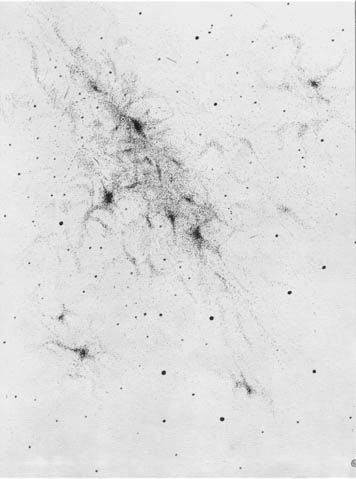
Sky Negative (Colorado), pen, 1983.
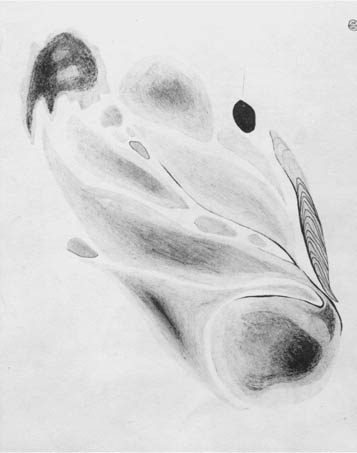
Finnish Motif, pen and pencil, 1982.
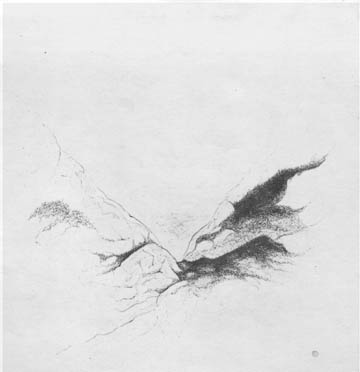
Rocky Mountain View, pen, 1983.
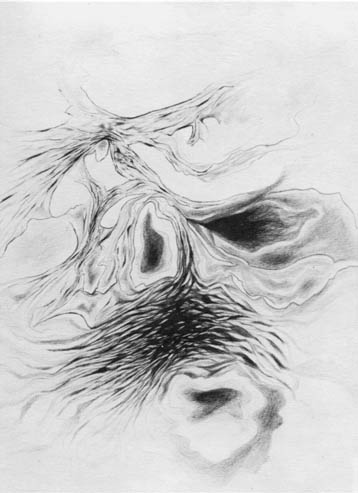
The Great Continental Divide.
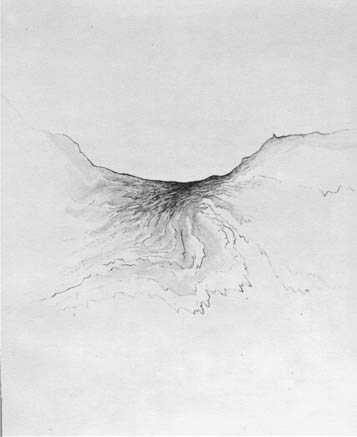
Incoming Tide.
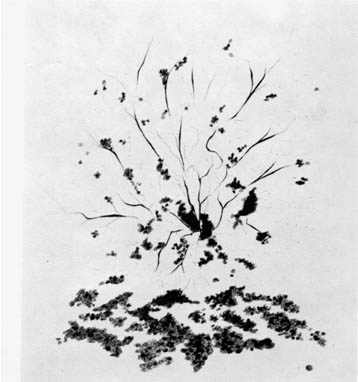
First Snow, pen and colored pencils, 1983.